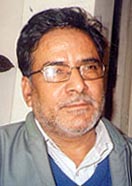SWEDISH SOUTH ASIAN STUDIES NETWORK
Trying to understand the situation in Nepal,
Friday 3 December 2005
One thing is striking about the political situation in the country.
There is no panic! All people we met looked at the ‘siege of Kathmandu’
and the Maoist domination of the countryside with anxiety but were not
terrified..
True, the tourists are taxed by the Maoist. For going to Mount Everest
a ‘toll’ of something between 3-500 rupees is charged. Members
of he local elite are also taxed. Sometimes Maoists force people to feed
them. We heard a story about how they ‘kidnapped’ teachers
and students for a shorter period to teach them about the real situation
in Nepal and the need for a new school curriculum. Researchers and officers
going for work in the rural areas would take caution, and try to establish
contacts with the local insurgents and negotiate a safe way to do their
work. Those we met and who had worked in rural areas, said that they had
been able to talk their way out by convincing the Maoists about the importance
of their work for the rural areas. Few of them had been taxed and they
had not felt threatened to their life.
At the same time, there is also the expectation among many intellectuals
that the insurgency will have a strong impact on the political development
in Nepal by placing the real issues on the agenda (see
report from meeting with Hari Sharma at Social Science Baha).
The most common interpretation among the researchers we met is that the
Maoists have used the opportunity of the rapid transition from a feudal
to a modern capitalist society and the feeble attempts at democratisation
of a political system from the nineteenth centre emphasising hierarchy
and procedural forms, rather than effective government for development;
a characteristic also pertaining to many public institutions including
the universities.
The rapid transition to a commercial economy in an era of globalisation
is perhaps more felt here than in other parts of South Asia, with the
large tourist industry, the many Nepali migrant labourers spread out over
South Asia and the massive inflow of global consumer goods. It is an uneven
development, creating wealth at one end and widespread poverty and unemployment
at the other and thus a strong feeling of relative deprivation among large
groups. The Nepali governments that have replaced each other during the
last 15 years have hardly been able to effectively counter these growing
cleavages in society in order to give some hope to the common man of a
better tomorrow.
In their mobilisation of the rural and urban poor, the Maoists ‘use’ a well established socialist rhetoric from the Chinese revolution: land to the tillers, equal opportunities for all, social justice … No new pamphlets have to be written on this. Poor people of Nepal have little knowledge of why real existing communism in Soviet Union and elsewhere failed. ‘The diagnosis is right, the prescription is wrong!’ as someone commented, and the fact is that they have also attracted many educated middle class persons. So far the Maoists have not needed to deliver an alternative development practice and the question is if they really mean business with a communist society at this stage.
The situation is prone to conspiracy theories of the ‘secret hand’
of the King, the elite, the Indians … but the fact is that a strong
mobilisation has taken place under the banner of what was thought as an
outmoded socialist ideology, obviously giving some direction to the aspirations
among the rural and urban poor and their intellectual companions.
With the recent negotiations in New Delhi between the Maoists and the
seven opposition parties, there are now signs that the first priority
of the Maoists is to create a stable and working democracy. ‘Only
bourgeois democracy opens the path to people’s democracy’
(as expressed by its leader Baburam Bhattarai, quoted by an Indian newspaper)
For this to be a peaceful process, they have to be recognised as an important
player in future negations. It may take time though, most people here
seem to think, and be far from a straightforward progression.
 |
| Chairman Prachanda. Photo: Narayan Wagle |
Staffan Lindberg
PS: An exclusive interview with Chairman Prachanda, supreme leader of
Communist Party of Nepal (Maoist), has been published by Kantipur.com
8 February 2006. The interview was made by Prateek Pradhan,
editor of The Kathmandu Post, and Narayan Wagle, editor
of Kantipur. Prachanda speaks about his party's current situation, insurgency,
and the ways ahead to resolve the conflict, and proclaims that the Maoists
want an end to blodshed in Nepal.
Read the article.
SASNET - Swedish South Asian Studies Network/Lund
University
Address: Scheelevägen 15 D, SE-223 70 Lund, Sweden
Phone: +46 46 222 73 40
Webmaster: Lars Eklund
Last updated
2006-02-13
